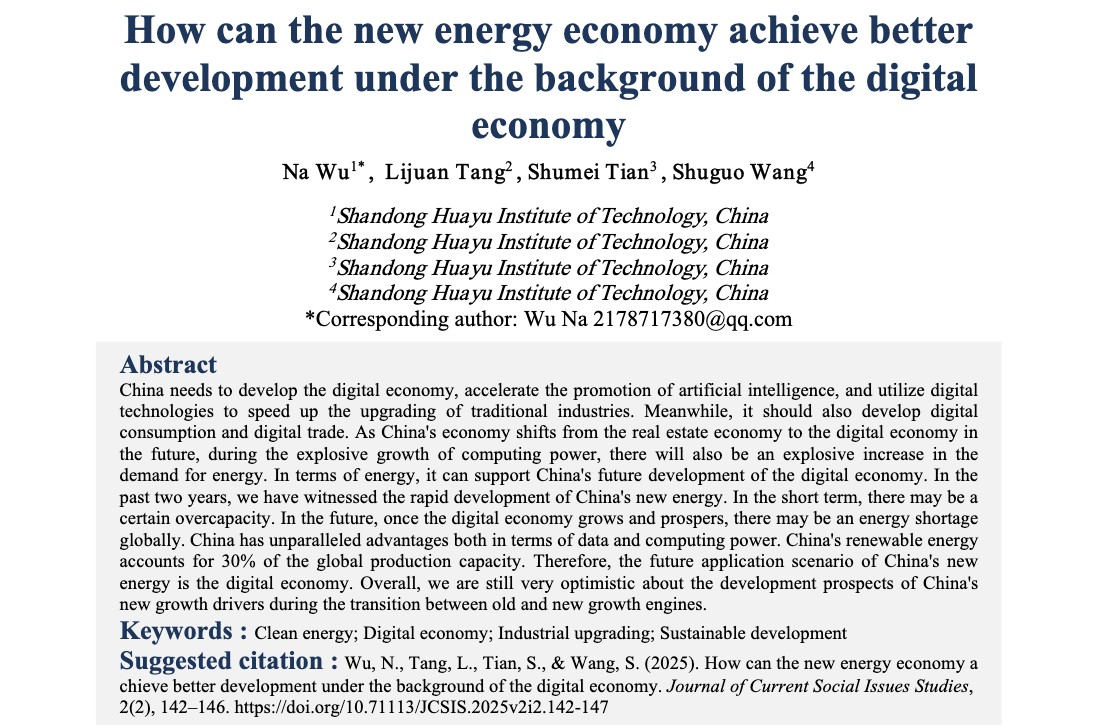How can the new energy economy achieve better development under the background of the digital economy
DOI:
https://doi.org/10.71113/JCSIS.2025v2i2.142-147Keywords:
Clean energy, Digital economy, Industrial upgrading, Sustainable developmentAbstract
China needs to develop the digital economy, accelerate the promotion of artificial intelligence, and utilize digital technologies to speed up the upgrading of traditional industries. Meanwhile, it should also develop digital consumption and digital trade. As China's economy shifts from the real estate economy to the digital economy in the future, during the explosive growth of computing power, there will also be an explosive increase in the demand for energy. In terms of energy, it can support China's future development of the digital economy. In the past two years, we have witnessed the rapid development of China's new energy. In the short term, there may be a certain overcapacity. In the future, once the digital economy grows and prospers, there may be an energy shortage globally. China has unparalleled advantages both in terms of data and computing power. China's renewable energy accounts for 30% of the global production capacity. Therefore, the future application scenario of China's new energy is the digital economy. Overall, we are still very optimistic about the development prospects of China's new growth drivers during the transition between old and new growth engines.
Downloads
References
[1]Zhang, X. L. (2024). Potential Impact of Land Policy Change and Population Ageing on House Price Volatility[J]. Modern Economics & Management Forum, 5(2).DOI: 10.32629/memf.v5i2.1988
[2]Liu, Y., & Zhang, X. (2024). Technological innovation, financing constraints, and carbon reduction in energy companies—From the perspective of the corporate lifecycle[J]. Journal of Infrastructure, Policy and Development. 8(8): 5860. DOI: https://doi.org/10.24294/jipd.v8i8.5860
[3]Meng, X. F. (2019). A brief discussion on the current development status of China's new energy economy in the new era. Chinese & Foreign Entrepreneurs, (24), 46.
[4]Tian, X. H. (2017). Analysis on the current development status of China's new energy economy in the new era. Modern Economic Information, (06), 350.
[5]Zhang, S. W. (2020). Analysis on the current situation and development obstacles of the new energy economy. Inner Mongolia Coal Economy, (19), 151-152.DOI:10.13487/j.cnki.imce.018639.
[6]Fang, T. S. (2022). Research on the economic policy effects of the high-quality development of China's new energy [Doctoral dissertation, Jilin University]. DOI: https://kns.cnki.net/KCMS/detail/detail.aspx?dbcode=CDFD&dbname=CDFD2023&filename=1022525774.nh
[7]Zhang, Z. X., Guan, Y. J., Tian, Y. Z., & Zhang, L. (2023). Introduction to the column on leadership and organizational innovation in the digital economy era. Management Science, (03), 1-2.
[8]Wang, F. H. (2023). Innovative paths of human resource management in the digital economy era. China's Collective Economy, (26), 110-113.
[9]Pang, R. Z., Meng, H., & Li, S. (2019). A Comparative Study on the Development of New Energy Economic Industries across the Taiwan Strait.
[10]Zhao, Q. (2022). Leading High-Quality Development with the Digital Economy. People's Daily, Issue 22.
[11]Jiang, X. J. (2022). On the Marginal Benefits of the Digital Economy. Study Times, Issue 10.
[12]Li, X. (2023). Trends and Challenges in the Development of the New Energy Economy.

Downloads
Published
How to Cite
Issue
Section
License
Copyright (c) 2025 Na Wu, Lijuan Tang, Shumei Tian, Shuguo Wang

This work is licensed under a Creative Commons Attribution 4.0 International License.






















